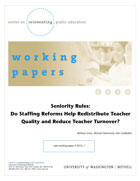Education reformers routinely call on school districts to stop hiring teachers based on seniority, which they argue interferes with effective staffing, especially in disadvantaged schools. The few researchers who have empirically studied the issue, however, disagree about whether seniority-based hiring is systematically associated with staffing problems for disadvantaged schools. We approach the question by examining what happens when a single urban school district eliminates seniority-based hiring preferences.
We conduct an interrupted time-series analysis of data from 1998-2005 and find that the shift from a seniority-based hiring system to a “mutual consent” hiring system leads to an initial increase in both teacher turnover and share of inexperienced teachers, especially in the district’s most disadvantaged schools. For the most part, however, these initial shocks are corrected within four years leaving little change in the distribution of inexperienced teachers or levels of turnover across schools of different advantage. The results suggest that although it might be necessary for school districts to lift hiring constraints to improve school staffing, lifting seniority-based constraints alone is unlikely to be sufficient.






